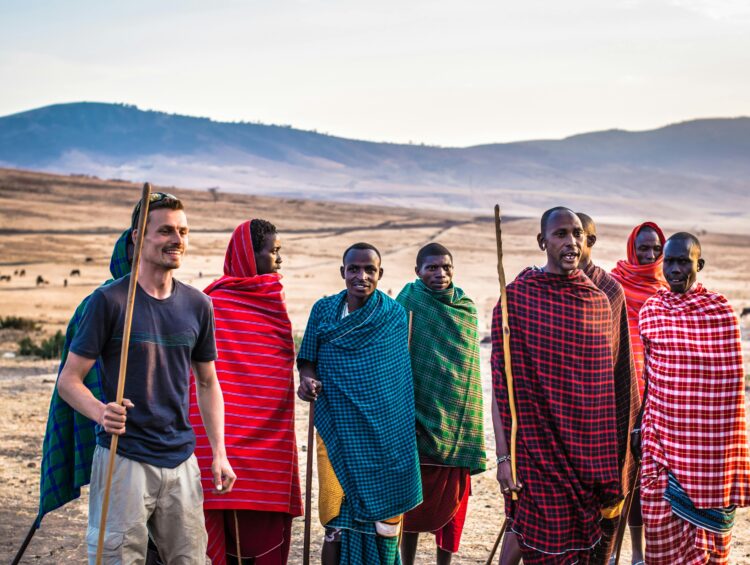Why Etiquette Matters in Tanzanian Culture
Tanzania is one of East Africa’s most welcoming countries, but showing respect for local traditions and customs goes a long way in deepening your experience and building genuine connections. This guide will help you navigate Tanzanian culture respectfully, whether you’re exploring Maasai villages, wandering Stone Town, or riding a dala-dala through the countryside.
Greetings and Communication
Greetings are a big deal in Tanzanian culture — expect handshakes, warm smiles, and polite conversation.
- Always greet people with “Shikamoo” (a respectful greeting to elders) or “Mambo / Habari” (informal) before jumping into a conversation.
- A handshake is customary, often with both hands or accompanied by touching the heart.
- It’s polite to ask about someone’s health or family — small talk is appreciated.
Dress Code: Modesty
Tanzania is a conservative country, especially in rural areas and along the coast where Islamic culture is prominent.
- Women should aim to wear skirts or trousers below the knee and cover their shoulders outside the main beach areas, or nightlife.
- Men are expected to avoid going shirtless in public settings.
- In Zanzibar and Stone Town, modest dress is particularly important, especially near mosques or during Ramadan.
For inspiration on how to travel respectfully in Zanzibar, read my Zanzibar Travel Guide: Beaches, Food, and Culture.
Visiting Villages and Local Communities
If you plan to visit a Maasai village, Chaga community, or other rural area:
- Always ask permission before taking photos or entering a home.
- Gifts are not required, but buying handmade crafts supports local families.
- Be open, curious, and humble. Your attitude matters more than perfect etiquette.
Want to explore more local experiences? Check out Best Things to Do in Tanzania Beyond Safaris.
Photography Etiquette
- Always ask before photographing people, especially elders, women, or children.
- Avoid photographing government buildings, military sites, or airports.
- If in doubt, a polite “Naomba kupiga picha?” (“May I take a picture?”) goes a long way.
Respecting Religious Traditions
Islam is the dominant religion in Zanzibar and parts of the mainland coast, while Christianity is widespread inland. Respect is essential:
- Avoid eating, drinking, or smoking in public during Ramadan.
- Dress modestly when visiting mosques, churches, or religious sites.
- Friday is a holy day for Muslims and many shops may close in the afternoon.
Tanzanian Hospitality and Social Norms
- Tanzanians are known for their “pole pole” (slowly, gently) lifestyle — things move at their own pace. Patience is key.
- You may be offered food or tea. It’s polite to accept or at least try a small amount.
- Use your right hand for eating and giving or receiving items.
What Not to Do in Tanzanian Culture
Avoid these common faux pas:
- Don’t show public displays of affection — it’s considered inappropriate.
- Don’t point with your finger — use your whole hand instead.
- Don’t criticize or raise your voice — especially in public.
- Don’t assume everyone is fluent in English — Swahili is the national language.
Related Tanzania Travel Guides
- Zanzibar Travel Guide: Beaches, Food, and Culture
- Tanzania Travel FAQ: Visas, Safety & More
- Best Things to Do in Tanzania Beyond Safaris
- Where to Stay in Tanzania: Hotels, Lodges & Budget Options (coming soon!)
- Ultimate Tanzania Safari Guide: Parks & Wildlife
Understanding and respecting Tanzanian culture will not only make your trip smoother — it will also open doors to authentic moments and meaningful conversations. Be curious, kind, and mindful, and Tanzania will welcome you with open arms.




